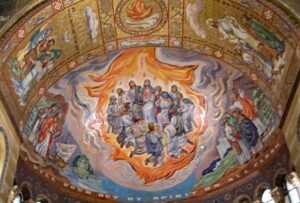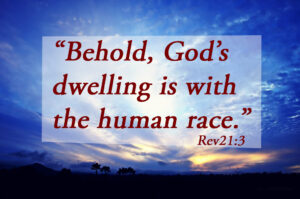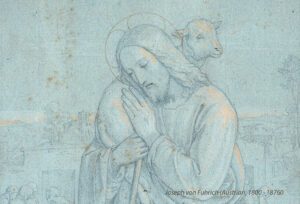“Simon’s mother-in-law lay sick with a fever. . . Jesus approached, grasped her hand, and . . . the fever left her. . . . He cured many who were sick . . . and he drove out many demons.
not permitting them to speak because they knew him.
Rising very early, he went off to a deserted place, where he prayed.
Simon . . . pursued him and said, ‘Everyone is looking for you.’
He told them, ‘Let us go on to the nearby villages that I may preach there also. For this purpose have I come.’
So he went . . . preaching and driving out demons throughout the whole of Galilee.” Mark 1:28-39
This is quite a scene: It may have been hard for Jesus to take all of this in: “the whole town was gathered at the door, . . . Jesus cured many who were sick and drove out demons, not permitting them to speak.” What happens next? There is no report of Him basking in the wonder of His talents, the adulation of the people. He “rises early and goes to a deserted place to pray.” – Jesus and the Father talking over what just happened. Even when Simon says he thinks Jesus should return to town, Jesus responds, “Let us go on to nearby villages.”. . And that they did, “preaching and driving out demons throughout the whole of Galilee.”
A LESSON FOR US TODAY
One of the lessons revealed in this story is how to respond to the ebb and flow of our lives. In these scenes, Jesus must be pondering where the people’s reactions to Him and his human interactions with them were leading. He was a human person, exactly like you and me in so many ways, but so much more does his divine nature interplay with His humanity, influencing his emotional, psychological and physical, very “human” responses to His encounters with others as He journeys from town to town.
Jesus heals one person, revealing a power in Him that far exceeds that which is “ordinary.” Word spreads and people come to see this unusual person, this phenomenon. They want to experience more.
He didn’t sit and marvel at what He did. He didn’t capitalize on His new-found attractiveness and ability to draw people to Himself because of His talent. No. He rises early and goes to be alone with the Father.
And, when Simon reminds Him of His outstanding appeal and tells Him to go back and build on what He had begun, Jesus says, “Let’s go on. . . For this purpose I have come. . . that I may preach.”
The very humanness of Jesus must have recognized the Simon’s (and our) being drawn to what felt so good, so successful, so real to him. It stems from our own incompleteness, our present lack of a deep, abiding relationship with God. Jesus had His divinity, while totally human Simon (and ourselves) have grace, drawing our human heart and soul to see and choose more than what “going back” had to offer. All of us are being drawn to something deeper and more real: the true wisdom that Jesus and the Father knew to be better.
It wasn’t what Simon thought to be best. It may not have been what Jesus’ humanity, without the fullness of His divinity, would have wanted. Jesus’ human nature was learning (and showing us) how to seek the Father, to let our humanness be drawn into divinity. This is His mission – to show us how to let ourselves be drawn into God.
Can I do this? Can I – instead of choosing to keep doing the things that are now working and producing good results, rise and go to a deserted place to sit with my God and Father – to listen, to “hear” the options, to choose wisely where I should go and what I should do?
Who rules my heart? Who rules my heart – the heart of one who professes to be a disciple of Christ? Is my heart ruled by the Father? Am I or should I be “rising early and going to a deserted place” to converse and listen to Him?
Or are my inner demons, my so-called “friends” and the messages of my culture getting the best of me – getting in the way of me becoming the best that is in me?
With whose commands and wishes do I comply?
Do I need to make some changes so that I can be a better disciple of the Jesus of this Gospel?
Sister Loretta




